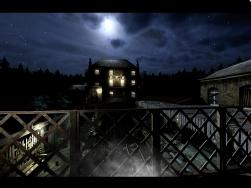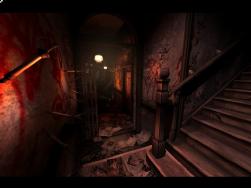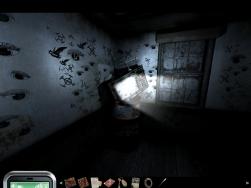|
Dark Fall: Lost Souls
 |
| Spooky enough for you? |
Lost
Souls is the third installment in Jonathan Boakes' Dark Fall series. It is set in
a fictitious English countryside town called Dowerton, as was the first game in the series
-
Dark Fall: The Journal. All of the happenings
in this game take
place in Dowerton train station and the station's hotel. You assume the
role of a detective inspector,
reopening a case that was closed all the way back in 1947.
Well, sort of. As with all games penned by the
inimitable Mr. Boakes, things are not always
quite as they seem to be. And as with all things game related
of late, Lost Souls
went completely under my radar. It was in fact released almost a year ago, and
I only just
happened to spot it in a shop on a recent trip to the U.K.
Jonathan Boakes' previous effort, 2008's The Lost Crown
utilised the Wintermute
game engine, and so does this one. If you have a wide screen monitor
like I do, don't make the same mistake as
I did and tick the 'Maintain aspect ratio' box
as you will then be playing the game in a letterbox. It displays
just fine in wide screen
aspect (I didn't perceive any stretching effect at all), and the shadows are much more
frightening
when they occupy the whole screen [cue muhahahaha].
Whereas The Lost Crown was mostly rendered in black and white with occasional splashes
of colour,
Lost Souls is done in full colour, though the overall tone of the game
is so dark that the colours rarely
leap out at you. But it's good to see a darker tone and
theme again for the third game, as this is what Jonathan
Boakes excels at - scaring the living
daylights out of us. The second game, Dark
Fall 2: Lights
Out, wasn't nearly as scary as the first and that made it less impressive in my mind. So
we're
back on the unimaginable horror track again and, in a word, Lost Souls is...
visceral.
The way you are primarily frightened in these games is through sound. Not necessarily the
overt kind of "Boo!"
sound, though this game contains a good few of those moments too. But
rather these subtle, ambient sounds for
which Mr. Boakes is so famous. Things that go bump
in the night. They absolutely creep you out. You need to play
these games with the lights
turned down and the sound turned up to get the maximum effect.
 |
| Better red than dead |
The high tech ghost hunting gadgets that were the mainstay of the first game
and The Lost Crown
are notedly absent from Lost Souls. But I suppose this is
due to the fact that your character is not here
to hunt for ghosts, but rather to ostensively
close a case that was abandoned 5 years ago. On the anniversary
of the disappearance of a
young schoolgirl called Amy, you return to Dowerton station in an attempt to gain
closure.
It's not really giving anything away to reveal that your character is a drunken schizophrenic,
as some
starting inventory items and frequent flashbacks indicate. This has a bearing on
the way things play out, and
that's all I have to say on that score.
Speaking of characters, I thought all were voiced rather well with the exception of your
character, The
Inspector, which is a pity. He was obviously meant to be portrayed as a bumbling,
pompous sort of bloke. But the
realisation was over-cooked and strained. And sorry, but the
game suffers a bit for that.
I'm going to spend a bit more time dissecting the puzzle design
than I normally do, because aside from the story,
that is what an adventure game is all about. The first item of note
in this respect is that Jonathan took a leaf
out of the Miller brothers' book and, as with
Riven, almost every puzzle
that has a numeric solution
is randomised for each play of the game. In a way, this is a noble attempt to nudge
players
towards actually understanding the puzzle solutions rather than just following a walkthrough
by rote when
the going gets tough. So kudos for that. On the other hand, it's hell for us
walkthrough writers ;-(
The puzzles themselves are pretty standard fare. Most are of a practical nature, which
is good. I don't recall
that there were many abstract puzzles incorporating the likes of
sliding tiles. However... one puzzle of this type
that involved a series of rotating wheels
was copied directly from The Lost Crown. That's more than a little
bit lazy in my
book. There are a few good puzzles that revolve around moving between the past and present
to put
a lost soul to rest, as the title suggests. These were done quite well.
 |
| 57 channels and nuthin' on |
The game interface is realised via a mobile phone, which occasionally doubles as a light source (and, in
doing so, provides a few really scary moments when you must use
it to illuminate a completely dark scene). In fact, the text messages you receive throughout
the game from a character named ECHO keep you focussed on what you must do
next, and this
was also a good bit of game design to cut down on the aimless wandering that is inherent in
some
adventure games. But there was one questionable bit of interface design in there that
made me resort to a
walkthrough. A chair had a newspaper on it, and that was the only obvious
hotspot in that close-up. But just a
few pixels above that was a hidden hotspot whereby you
obtained a farthing coin that was necessary to complete
the game. Not fair, and that took
the game down a peg all by itself. Really, issues of this nature should be
weeded out during
play-testing.
What it boils down to in the end is another well-realised effort to keep us on the edge of
our seats for a few
evenings. I enjoyed this dose of Dark Fall much more than the
previous one. Though I suspect this particular
story line has drawn to an end, who knows?
If there's more in store for us in this vein, please bring it on, Mr.
Boakes.
Copyright © Steve Metzler 2010.
All rights reserved.
System
Requirements:
Windows XP (SP2/SP3) or Vista, Pentium IV 1.4 GHz (or AMD equivalent), 512
GB RAM (1 GB RAM Vista), 128 MB DirectX
9.0c compatible 3D accelerator video card, 4x DVD-ROM,
2.5 GB hard disk space, DirectX 9.0c compatible sound card
|

